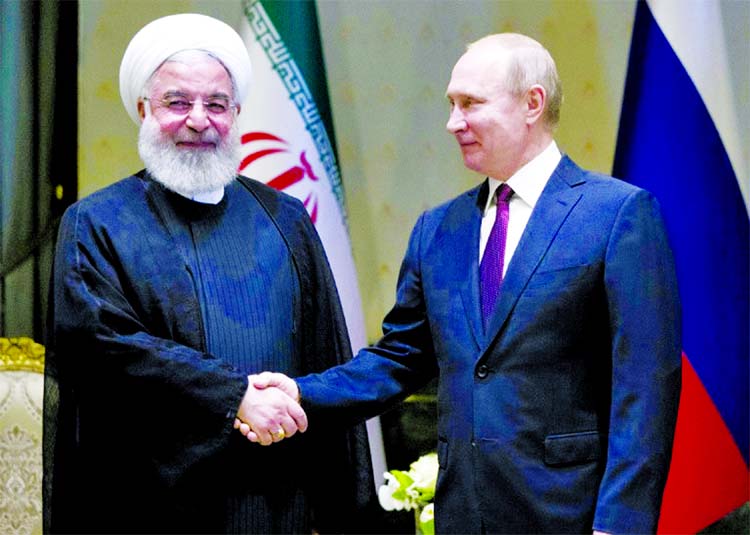
AFP :
The presidents of Iran, Turkey and Russia met on Wednesday for their second tripartite summit in under six months, aiming to speed the peace process for Syria and bolster their influence in the country.
Turkish President Recep Tayyip Erdogan hosted his Russian and Iranian counterparts Vladimir Putin and Hassan Rouhani in Ankara at his presidential palace for a meeting that could have a critical bearing on developments in Syria.
The meeting is the second such tripartite summit after the first hosted by Putin in November in the Black Sea city of Sochi and will be a new symbol of the increasingly deep cooperation.
The three powers have backed peace talks in the Kazakh capital Astana which they argue are a parallel process to support UN-supported discussions in Geneva.
Experts say that Ankara, Moscow and Tehran have quite different interests but have for now decided to team up to take advantage of the waning Western influence in Syria.
The Kremlin’s special envoy on the Syria peace process Alexander Lavrentiev said the summit would allow the chance to assess the current situation and set out future prospects.
Hours before the summit, US President Donald Trump said he wanted to “bring our troops back home” from Syria after indicating last week the US would withdraw from the country “very soon”.
Jana Jabbour, professor of political science at Sciences Po university in Paris, said the aim of the summit was to “reorganise and renegotiate the zones of influence in Syria as well as to reflect on the future of Syria’s north after US withdrawal”.
Turkey drove out Kurdish militia from Afrin city on March 18, two months after it launched an offensive in northern Syria supporting Syrian rebels.
Erdogan has indicated Turkey could extend its operation to the YPG-held town of Manbij as well as Ayn al-Arab (Kobane) and Qamishli, all east of Afrin.
“Erdogan likely wants to use the summit to secure Russian and Iranian support for expanded operations in northern Syria or Iraq,” said Elizabeth Teoman, Turkey analyst at the
Institute for the Study of War (ISW).
After bilateral talks with Putin on Tuesday, Erdogan said Turkey and Russia would continue their cooperation “focusing on our common interests” in Syria.
Jabbour said Iran and Russia would give free rein to Turkey in the north against the YPG in exchange for bringing the groups it controls to the negotiating table.
“Turkey remains a key player in the Syrian crisis especially because of the opposition groups it controls. A solution to the crisis is unimaginable without Ankara’s contribution,” she added.
The presidents of Iran, Turkey and Russia met on Wednesday for their second tripartite summit in under six months, aiming to speed the peace process for Syria and bolster their influence in the country.
Turkish President Recep Tayyip Erdogan hosted his Russian and Iranian counterparts Vladimir Putin and Hassan Rouhani in Ankara at his presidential palace for a meeting that could have a critical bearing on developments in Syria.
The meeting is the second such tripartite summit after the first hosted by Putin in November in the Black Sea city of Sochi and will be a new symbol of the increasingly deep cooperation.
The three powers have backed peace talks in the Kazakh capital Astana which they argue are a parallel process to support UN-supported discussions in Geneva.
Experts say that Ankara, Moscow and Tehran have quite different interests but have for now decided to team up to take advantage of the waning Western influence in Syria.
The Kremlin’s special envoy on the Syria peace process Alexander Lavrentiev said the summit would allow the chance to assess the current situation and set out future prospects.
Hours before the summit, US President Donald Trump said he wanted to “bring our troops back home” from Syria after indicating last week the US would withdraw from the country “very soon”.
Jana Jabbour, professor of political science at Sciences Po university in Paris, said the aim of the summit was to “reorganise and renegotiate the zones of influence in Syria as well as to reflect on the future of Syria’s north after US withdrawal”.
Turkey drove out Kurdish militia from Afrin city on March 18, two months after it launched an offensive in northern Syria supporting Syrian rebels.
Erdogan has indicated Turkey could extend its operation to the YPG-held town of Manbij as well as Ayn al-Arab (Kobane) and Qamishli, all east of Afrin.
“Erdogan likely wants to use the summit to secure Russian and Iranian support for expanded operations in northern Syria or Iraq,” said Elizabeth Teoman, Turkey analyst at the
Institute for the Study of War (ISW).
After bilateral talks with Putin on Tuesday, Erdogan said Turkey and Russia would continue their cooperation “focusing on our common interests” in Syria.
Jabbour said Iran and Russia would give free rein to Turkey in the north against the YPG in exchange for bringing the groups it controls to the negotiating table.
“Turkey remains a key player in the Syrian crisis especially because of the opposition groups it controls. A solution to the crisis is unimaginable without Ankara’s contribution,” she added.

